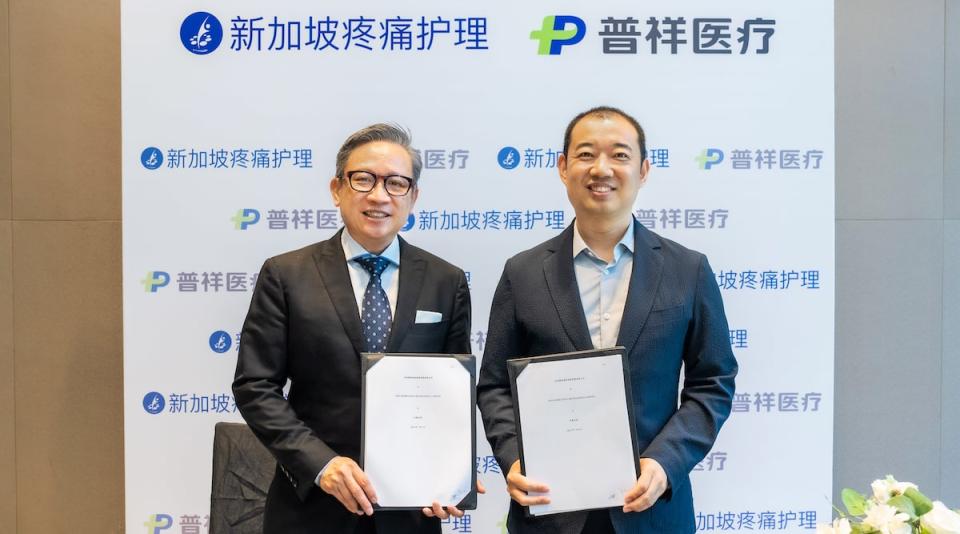Singapore Paincare enters China market through JV with Puxiang Healthcare subsidiary

Singapore Paincare inks JV agreement with Puxiang Healthcare to enter China market.
Singapore Paincare Holdings announced that it has signed a non-exhaustive and non-binding term sheet to set up a joint venture company (JVCo) with Beijing Puxiang Hospital Investment Management (BPHIM), a wholly-owned subsidiary of China’s Puxiang Healthcare Holding.
The JVCo PuXin Pain Technology Hospital Management Company will be introducing pain care services in Puxiang Healthcare’s group of 15 community hospitals in the Chinese cities of Beijing, Hebei and Tianjin.
This development follows on the heels of Singapore Paincare’s press release on June 14 in relation to its 51%-owned subsidiary’s investment of approximately $7.6 million for 2.3% of the total issued share capital of Puxiang Healthcare. It cements the parties’ strategic relationship to leverage each other’s resources, expertise and clinical assets.
Singapore Paincare will own 49% of the JVCo with the majority share of 51% being held by BPHIM. Under the terms of the agreement, BPHIM will identify a core clinical team of doctors who will undergo training at the group’s Paincare Academy. The doctors will be trained to deliver Singapore Paincare’s treatment regimen and methodologies, which will form the basis for the group to establish its pain care ecosystem in China comprising primary healthcare, specialist pain care as well as rehabilitative services.
Meanwhile, BPHIM is expected to bring its local know-how and market intelligence to the table by providing strategic direction for future development and growth as well as to seek strategic investors and partners.
During the joint venture signing event, Xu Hua Yong, president of Puxiang Healthcare said that this JVCo will be present in all of BPHIM’s hospitals in China – current and upcoming. While it has 15 hospitals currently, it intends to expand its presence within China and expects to reach a total of 20 hospitals by the end of this year and 100 hospitals in the next 10 years.
“We believe Singapore Paincare’s expertise will take the pain services at our hospitals to the next level and bring much needed relief to patients with related conditions. We are excited about their vision for a pain care ecosystem and we look forward to work with them to establish this at our hospitals,” says Xu.
Dr Bernard Lee, executive director and CEO of Singapore Paincare says: “The JVCo will enable Singapore Paincare to tap into China’s vast domestic healthcare market and it is also in line with our vision to replicate our pain care ecosystem abroad. The roll-out is expected to take a period of 12 months and we intend for it to be an important proof of concept for the group’s future overseas expansion plans. We expect the partnership to raise our profile in the China market and we are optimistic about our plans for expansion in other regional markets.”
Lee also expects for this JVCo to produce a “favourable” outcome to the group’s future topline and bottomline.
In the meantime, Singapore Paincare has resumed talks with potential and synergistic partners overseas following the opening of borders. The markets it is eyeing are those from which the bulk of its foreign patients hail from as this means a higher possibility of immediate brand recognition for the group. Aside from China, the group is eyeing to expand into Indonesia, the Philippines, Malaysia and Vietnam. Lee shares that the group is working towards entering into one of these markets by the end of this year.
As at 1.10pm, shares in Singapore Paincare are trading at 18 cents.
See Also:
Click here to stay updated with the Latest Business & Investment News in Singapore
Singapore Paincare Holdings acquires Boon Lay clinic for $1 mil
Jardine C&C partners Carro to explore opportunities in automotive retailing
Singapore Paincare Holdings acquires orthopaedic practice for $3.1 mil
Get in-depth insights from our expert contributors, and dive into financial and economic trends

 Yahoo Finance
Yahoo Finance 